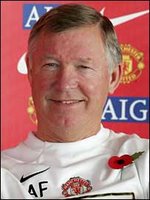Fergie's 20 Year Old Vintage Maturing Nicely
 In recent seasons, it has seemed that Alex Ferguson’s long reign as manager of Manchester United had begun to show worrisome signs of its age, as if its sell-by date had long passed. Now, however, after a fine start to the current Premiership season, and after a weekend which, as well as marking the 20th anniversary of his appointment at Old Trafford, saw his team take a three point lead over Chelsea at the top , Ferguson’s stewardship looks in as healthy nick as ever.
In recent seasons, it has seemed that Alex Ferguson’s long reign as manager of Manchester United had begun to show worrisome signs of its age, as if its sell-by date had long passed. Now, however, after a fine start to the current Premiership season, and after a weekend which, as well as marking the 20th anniversary of his appointment at Old Trafford, saw his team take a three point lead over Chelsea at the top , Ferguson’s stewardship looks in as healthy nick as ever.The effect of Chelsea’s rise under Abramovich and Mourinho was not only to squeeze the margin of error allowed in challenging for the league, but also seemed to create a new, harsh English football environment in which the likes of Ferguson, who had bestrode the country almightily for a decade, could not survive. A dinosaur rendered extinct by an unexpected meteor.
His efforts in creating yet another successful United team looked futile, as if his innate skill for moulding a side had deserted him. The loss of Roy Keane, or at least the seeming inability to replace the at first waning, then banished, former captain, troubled him most. Like a magician without his trusty wand, he seemed unable to conjure the spell of success without the influence of Keane’s drive and spirit, and his teams now looked vulnerable and flimsy.
While his side’s current resurgence cannot be said to have been brought about by finally successfully replacing Keane, the plan to do so looks closer to fruition than ever. During the close season Ferguson pursued the signatures of Michael Carrick and Owen Hargreaves, the former successful, if at a staggering price, the latter bid failing due to Bayern Munich’s resolve, and despite the player’s wishes. Ferguson and the player are both believed to be committed resurrecting the transfer at the next available opportunity.
The idea seemed to be to replace Keane and regenerate United’s midfield with a two-pronged approach: Carrick’s vision and passing game allied to Hargreaves’ frenetic energy and running. That, with only half of the solution in place, United appear to be operating at something approaching their former sweeping capacity can be put primarily down to the rejuvenation of another of the brightest lights of Ferguson two decades in charge: Paul Scholes.
Scholes’ form so far this season has been an unexpected joy not just for United fans, but also for anyone who watched the unassuming red-head weave his singular offensive midfield magic for much of the late 1990s and early 2000s. Scholes’ sense of the timing of runs into the box was so perfect as to render him almost unmarkable. It was almost as if his retiring personality and demeanour helped him become invisible to defenders, until he would seemingly materialise in the penalty box and in a goalscoring position.
He accompanied his masterful ability to move into dangerous positions with a lethal finishing touch, as natural a goalscorer’s penalty-box sensibility as any of the greatest centre-forwards.
Aside from his abilities as a surrogate striker, his passing from advanced positions in midfield was flawless and his shooting from distance excellent, as anyone who recalls the volley from a corner taken directly to him at the edge of the box against Bradford some years ago will agree.
But struggles with injury, in particular a serious eye problem, had threatened to undermine Scholes’ career terminally as he moved into his thirties, leaving Ferguson’s already chasmic central midfield void seem doubly vast. Suddenly, as this season began to unfold, the sight of Scholes playing better than ever - for the fact of his seniority now seems to have added a hitherto unsuspected leadership quality to his play - became one of the major stories.
When United played Liverpool a few weeks back, it would have been in the knowledge that their old rivals had mastered them completely in that central area in recent contests between the two. Liverpool play lining up with five in the middle to United’s two suggested that the Merseysiders’ dominance in midfield would continue.
That United subdued Liverpool so categorically in the middle that day was testament to the aggression and zip that the home side’s midfield, inspired by Scholes, played with that day.
Since then United have been improving with every performance, and every game seems to bring a further rekindling of the energy and style with which they swept all before them in the 1990s. The manner of recent victories over Bolton and Portsmouth made those two early-season high achievers appear like the honest toilers they most probably are, but the flash of United’s football was a joy to watch nonetheless. The return to form of Wayne Rooney, the concessions to maturity of Cristiano Ronaldo and the old-fashioned solidity of Nemanja Vidic have all helped, but the importance of Scholes’ role as conductor of these virtuoso players is key.
Alex Ferguson’s latest team face many tests before they can be classified as worthy successors to their glorious predecessors, most importantly when they face Chelsea head-to-head. But were they to provide their manager’s twentieth season in charge with a league title-winning conclusion, after it had seemed that the old man’s touch was long gone, it would surely rank with the greatest achievements of any of the nineteen that preceded it.






0 Comments:
Post a Comment
<< Home